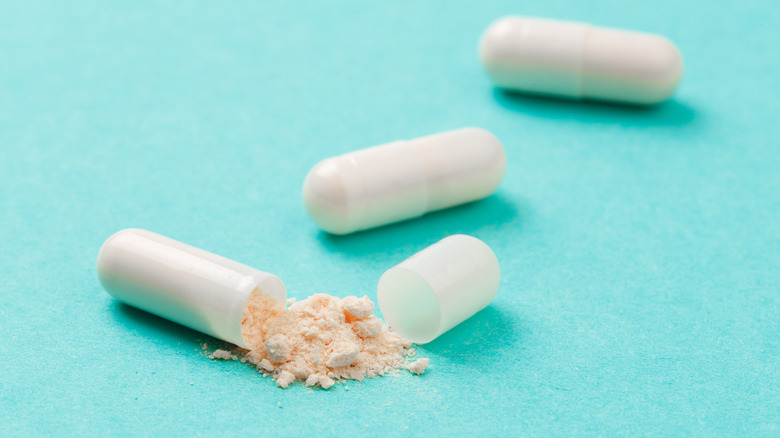The Real Difference Between Probiotics And Digestive Enzymes
It's not unusual to be confused about the difference between probiotics and digestive enzymes. Both aid your digestive system, but they each do it a different way. Here's what you should know.
Probiotics are live microorganisms that are beneficial for various parts of your body, including your digestive system (via WebMD). They work by helping you replace good bacteria in your body and keeping the levels of bacteria balanced. They can also aid digestion by encouraging food to travel through the gut at an appropriate pace. Taking probiotics can help prevent constipation, diarrhea, and fight against the symptoms of irritable bowel syndrome.
Other potential health benefits of probiotics are thought to exist as well. Although scientists can't verify the efficacy of taking a probiotic supplement for these purposes, some people have found that probiotics can help with skin conditions like eczema, oral health, and preventing colds and allergies. It's important to note that many probiotic supplements are not regulated by the FDA. It's always a good idea to check with your doctor before taking probiotics to see if they will be beneficial to your health and what brand your doctor recommends.
Digestive enzymes specifically help you to digest food
While probiotics are live bacteria and yeasts that help your gut stay balanced, digestive enzymes are nonliving enzymes that help your body absorb nutrients from food (via Healthline). These enzymes naturally occur in your body and break down the carbohydrates, fats, and proteins from the food you eat. While their real goal is to access the nutrients in food, breaking everything down also allows the unused parts of what you eat to pass through your digestive system without any issues.
Some people do not have as many digestive enzymes in their bodies as they need. In addition to malnutrition, this can cause digestive upset. People with certain conditions like chronic pancreatitis, cystic fibrosis, or diabetes are prone to having a shortage of digestive enzymes. You may also want to take digestive enzymes if you experience gas, bloating, or indigestion after eating (via Mindbodygreen).
Once again, talk to your doctor before taking digestive enzymes. They can help you figure out the cause of your digestive issues and find the best solution.


